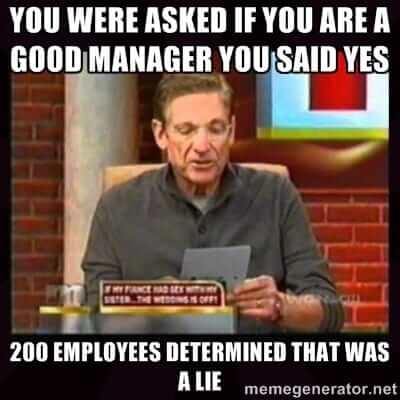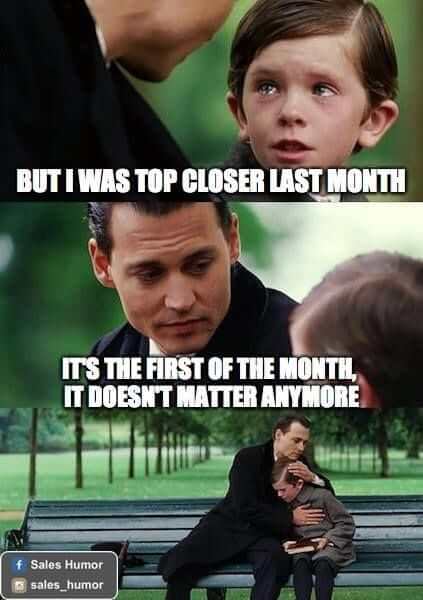What is a Sales Manager
A sales manager is a person that’s responsible for building, leading, and managing a sales team within an organization.
He or she is in charge of a variety of functions within an organization, including setting sales goals, managing sales quotas, creating sales plans, monitoring progress, overseeing sales training, keeping an eye on key accounts, and recruiting, hiring, and mentoring sales reps.
A sales manager will work closely with managers of other departments, as well as communicate with prospects and customers on a regular or semi-regular basis.
12 Sales Manager Responsibilities You Need to Master
As a sales manager, you have an incredible opportunity to impact your team. However, sales manager responsibilities are sometimes vague. You’re in the ideal position to really empower and motivate your salespeople and kill your sales goals using your amazing sales manager skills. Unfortunately, you also have the opportunity to do the exact opposite if you don’t know how to be an effective sales manager.
Their success, or failure, largely falls into your hands. Below are the sales manager duties that you need to master. Nothing like a little pressure, right?
Before we get started, we thought it would be helpful for you to grab this example sales rep hiring template (no email required!).

Fortunately, our competitive nature and sales leadership skills are what brought us into sales in the first place. But how do you keep up on those days when emails continue filling your inbox and the phone is ringing nonstop?
Just as you are constantly asking your team members to push and improve themselves, you need to put the same emphasis on improving your sales management skills. Use your competitive nature to compete with yourself!
The largest mistake most sales managers make is either over or under leading the team. Find your own careful balance.
Every day you need to make an effort to be even more effective than the day before.
Don’t get overwhelmed.
Don’t freak out.
Take a deep breath and follow these 12 tips for becoming a better sales manager. Trust us, you will be happy you did!
1. Remain open to feedback

We’ve all had that one manager in our lives that stands out. Not because he/she was a great communicator or an inspiring mentor…but because he/she was a jerk.
One of the best ways to not be that jerk is to be open to feedback always.
One of the best ways to not be that jerk is to be open to feedback always. Share on XThe fastest way to run your team into the ground is to not foster an open environment that allows plenty of feedback on goals you have set, deadlines you have created and areas of the sales process that need improvement.
Whenever you introduce any of these to your team, make sure you specifically invite feedback. It sounds basic enough, but fear of offending or angering a manager is one of the main reasons that employees become frustrated, suffer silently, and eventually leave their employer.
Typically an employee leaves a position because of interactions (or lack thereof) with managers rather than because of a problem with the actual work.
2. Recognize tremendous effort

A pat on the back goes a long way.
Whether we are 5 or 50, we like to hear when we are doing something well. Let’s face it, we live for recognition.
Nurture this need whenever possible but certainly don’t give out undeserved praise.
Another surefire way to really crush team dynamics is to give too many of those pats on the back. Sure, you need to recognize those tremendous accomplishments and moments of incredible effort but be sure you are reserving praise for when it is appropriate.
Think of it this way – you are trying to train your new puppy. You want to reward him every time he learns a new trick. Simple, right? Well, if you are giving him a treat every time he does something cute, funny, silly, etc. he isn’t going to strive to learn much more, is he? You need to inspire your employees to learn “new tricks” of their own while, pushing them to not only better themselves but to also get praise and recognition from you. This is a sales manager skill that is needed to really encourage your employees.
3. Implement new technology when possible

Another often underutilized aspect of being a sales manager is the need to keep an eye out for new technology that can improve your sales process and daily.
This means staying up-to-date on new sales software that can make everything from lead generation to maintaining client relationships easier. Even though it doesn’t seem like it, finding the right software helps to improve your sales manager skill set.
You’ve heard the adage “work smarter, not harder,” right?
Having the proper tools for your team accomplishes just that. Never stop looking for ways to improve performance.
4. Focus on the sales process
Don’t be blinded by your goals, keep them in mind while focusing on the sales process.
There are so many things we can’t control every day. Take control of the factors that you can. Work on perfecting each step of the sales process, not just a number you want to hit.
Once you hone in on the details, the larger picture sales will most definitely follow.
5. Be transparent

It’s perfectly acceptable to set your own boundaries and not broadcast every decision you make, but when it comes to your goals and those of your team members you need to be transparent.
You are the sales leader, which means that you need to lead by example. Set your own goals and show how you are measuring up.
Running a completely transparent team is a great way to push your salespeople harder. They not only focus on hitting their own goals, but when they see how many calls and what numbers their co-workers are hitting, that will ignite yet another fire under them to better their performance. This is where a great tool like a sales manager leaderboard and prizes may come in handy.
6. Develop a method for measuring success
How can you figure out if your team is hitting goals or making more calls if you don’t have a baseline to start from and a reliable method for measuring success?
It’s impossible.
How can you know if your goals are a bit too lofty for your team, without measuring?
You can’t.
Okay, you get the idea – measurement is important. Like, really important.
This is where great sales software can really come in handy. Having a way to track and post success consistently takes the guesswork out of the process.
7. Admit mistakes

Part of being a great sales manager is being humble. Lead by example. No one gets particular enjoyment out of admitting they made a mistake but it’s key to showing you are a great sales leader.
Let’s face it. Do you respect those people you have interacted with in life who never own up to making a mistake?
Of course not.
Owning up to a mistake shows that you are human. People respect and trust you as a sales manager when you show that mistakes happen and can be a learning opportunity.
Another benefit of owning up to your mistakes is that your employees will not be as likely to hide their own mistakes from you. Once you can identify that there is an issue, you can help develop a plan for getting it ironed out. Nurture this opportunity to earn respect and bust open the doors of communication.
8. Remain organized
Work can get overwhelming when you let things get chaotic.
Details will slip through the cracks and before you know it, you’ve lost control completely.
One of the most important things to organize is your time. If you have a tendency to get caught up in what you are doing and lose track of time, try using reminders on your phone for each task you need to accomplish that day.
This is as easy as setting aside 45 minutes to read and respond to emails or an hour for your weekly team meeting. Once you force yourself to be organized, you will be one step closer to being a sales managing mastermind!
9. Earn the trust of your team
It’s easy enough to simply advise you to earn trust, right? But how the heck can you do that?
Well, some we have already discussed like leading by example and admitting your mistakes as they happen, but others will take a bit longer.
Trust is something you aren’t going to earn overnight. Be consistent in all that you do and lead by example.
Never underestimate your employees, they are observing you just as much (if not more) than you are observing them. Keep this in mind with all that you do.
Spend one-on-one time with your employees. This is one of the best ways to earn trust. Additional trust earners include never throwing blame around, keeping promises, and above all else, consistency.
10. Be a coach
Behind every championship-winning team is a great coach.
Behind every outstanding sales team is a great sales manager or sales coach.
Coaching your team not only can help steer them toward greatness, but it also offers an opportunity to nurture the relationship and build trust.
Part of your sales manager’s skill and responsibility is hiring. Get your copy of our sales representative job description for free. Use it in your recruiting efforts to recruit rockstar candidates!
11. Lead but don’t micromanage

The very worst management style is the micromanager. He/she checks up on you multiple times a day, tells you how to schedule each second of your time and if a day goes by where you aren’t left rolling your eyes at some point, it’s a miracle.
Don’t be that micromanager.
Offer support, offer assistance but don’t turn your employees into robots.
Giving your sales team support while also allowing them to try things on their own is a great way to help them grow, learn time management skills, and how to hit goals on their own. Sure, you can be watching with a careful eye, but allow mistakes to happen (not ALL the time but enough to learn from) and be there to help when needed.
On the other side of the spectrum don’t take on too much of a free-range management style either.
It’s like parenting – no one wants to have helicopter parents and no one wants to have their parents forget to feed them either.
12. Don’t be afraid to fire a poor performer
This is one that many managers shy away from. Great managers, however, realize sometimes you just have to let an employee go.
If you are allowing poor performers to have all the same benefits as your top salespeople, those top salespeople are going to leave you pretty quickly.
Just as you want to reward great behavior, you want to squash bad attitudes and poor performance just as quickly. It can truly take over the team like a plague. Firing an employee isn’t fun, it doesn’t make you feel like a great person, but in many situations, it’s a necessary evil.
While being a sales manager would be a heck of a lot easier if you had a guidebook for every step along the way, it wouldn’t be the great learning experience you are going through now.
The bottom line is that you should manage the same way you want to be managed. Be fair, trustworthy, humble, and a great example for your team, and not only will they like you, but they will work harder for you too.
How Much Does a Sales Manager Make
A sales manager’s salary will depend on the specific company they’re working at, the company’s location, and the sales manager’s experience.
According to Glassdoor, the average base pay for a sales manager in the US ranges between $51,000 and $120,000 per year, with the average being $78,920 per year. This does not include bonuses and commission.
How to Become a Sales Manager
So, you want to become a sales manager?
Most companies look for at least five years of sales experience when hiring a sales manager. You’ll also need a bachelor’s degree in business administration or marketing.
The easiest way to become a sales manager is to apply for an assistant sales manager job after getting some experience as a sales rep.
Once you gain enough experience as an assistant sales manager, you should work towards getting a promotion or switching companies to get to the position of sales manager.
6 Qualities of a Great Sales Manager
If you want to be a great sales manager, you’ll need to master the following skills:
Quality #1: Leadership
The most important skill you’ll need to master to become a great sales manager is leadership. You’ll need to learn how to motivate, incentivize, and empower your sales team so that they can help reach company goals.
As a true leader, you’ll also need to be comfortable with experimenting when the team’s performance isn’t in line with the current monthly or quarterly goals, as well as doing everything you can to ensure that each of your sales reps is successful and doing their best.
Quality #2: Communication skills
Having great communication skills is crucial for being a successful sales manager.
Most of your work will revolve around meeting and talking with either sales reps, prospects, clients, or managers from other departments, so you need to know how to collaborate with others and communicate effectively.
Quality #3: Organizational skills
Apart from being a great communicator, you’ll also need to know how to organize all your daily activities as a sales manager.
There’ll be a lot of things that will be demanding your attention, and you’ll need to learn to both prioritize tasks and manage your time effectively.
A good way to do this is to start planning your entire schedule at the beginning of every week, and making sure to allocate enough time for everything you need to do, including team communication, training, experimenting, and sales forecasting.
Quality #4: Mentoring and coaching
A part of your job as a sales manager will be to train your sales reps and help them grow professionally. This will include conducting sales training, mentoring team members, and guiding reps through challenging deals.
You should constantly be looking for ways to improve your sales reps’ performance and help them grow.
Quality #5: Creating sales plans
As a sales manager, you’ll need to find ways to enable your team to perform at a high level consistently. This is where a sales plan can help.
You’ll need to learn how to create a sales plan that’s easy to follow and includes all the sales process documentation, templates, and scripts your sales reps need to maintain or improve their performance.
Quality #6: Recruiting
A large part of your job as a sales manager will involve finding new sales reps for your team. Before you can recruit and hire sales reps, you’ll need to learn how to identify great salespeople.
Think about what traits and characteristics make a good rep? What kind of qualities do the top-performing members of your sales team have?
Write all of this down and use it to have an easier time hiring sales reps.
15 Tips for Hiring Members of a Winning Sales Team
When you are managing a sales team, the moment you realize you need more team members can be a bittersweet one.
After all, you finally have everything going just as you like it…now you need to welcome in new colleagues and get them on board with your current initiatives. Just keep in mind that the very fact
Just keeps in mind that the very fact you are looking to grow your team is of course a GOOD thing – it’s a sign your business is thriving and growing.

With all this in mind, of course, you realize growth is good but it doesn’t mean you can’t still dread the process just a little bit.

If you follow these tried and true tips for hiring rock star sales team members, your life is about to get a whole lot easier (and your team will continue to prosper).
1. Cut the interview process to one day
If you are dreading the actual hiring process, you are not alone. This tip, however, is going to make your life a whole lot easier. Normally, the hiring process will take weeks, possibly even months, so reserving just one day to do the interview process will save you time and allow you to remember all candidates with a fresh mind. Also, you WANT to hire candidates that are in demand so don’t let anyone snatch them out from underneath you!
If you are working with a recruiter, this is a great way to get them motivated to find you the right people. Typically, recruiters will get paid when you hire someone. If they know you are interviewing for one day, they will be even more motivated to get great candidates in front of you since they realize there is a chance you will hire someone right away.
No surprise there, people are motivated by the quick sell!
If you find the perfect member of your sales team through the one-day interview process, you can make an offer within 24 hours.
2. Have more than one interviewer
The interview doesn’t have to be a one-man show. In fact, it’s better to double on interviewers for a variety of reasons.
For one, you will be able to keep the interview moving right along. One person can ask questions while the other jots down notes. Often when we are the only one interviewing, we miss those important non-verbal cues we are getting from a potential employee as we put our heads down to write notes. Now you will be able to fully evaluate reactions and facial expressions.
With two interviewers in the room, you also have the opportunity, to be honest. You may be surprised by this but by discussing the interview with the other interviewer in front of the potential hire, you are getting down to the nitty-gritty right away. If the two of you are responsible for making the decision, give feedback and let the person know if you think they are a good fit or not.
This will not only save you time but your interviewee as well. Believe it or not, they will appreciate the honesty!
3. Focus on the skill, not on experience
When we decide to bring a new member to our sales team, we have many items on our checklist that we are looking to have filled.
Among these are education and job experience.
While these are the two most important things, they are also entirely different. The biggest mistake hiring managers make is valuing education and experience over skill.
While it may be hard to get a real handle on a person’s skill level by reading their info on a resume and sitting with them for half an hour, there are signs to look for when identifying a skilled salesperson.
Do they have hunger but lack the experience you were hoping for? Hire them!
Do they have the raw intelligence and charisma but only a year of experience behind them? Hire them!
Again… we repeat….hire skill over experience and your sales team will prosper.
4. Have the candidate sales pitch on the spot

The search for a great sales representative comes down to finding people who can sell on the spot, right? Put your interviewee to the test by having their sales pitch YOUR company.
Many interviewers will do a similar version of this where they ask the candidate to sales pitch their current company. The problem with this is that typically people are really comfortable with what they know and chances are this won’t show you a true test of skill.
By comparison, when you have the candidate do a sales pitch of your company you can see how well they prepared and how they can discuss certain aspects that they are not as familiar with.
The key to this is not just looking for them to regurgitate information; it’s more about seeing how the candidate handles pressure and how they can communicate during this stress test.
5. Don’t let the resume fool you
When it comes down to it, the resume is just a piece of paper – you are hiring a person. Keep this in mind when you are reviewing potential candidates.
Of course, you have no choice but to make an immediate judgment when sorting through the many resumes that will land on your desk, and that initial cut is much needed. Once you have your candidates in front of you, however, that piece of paper tends to lose significance.
6. Weed out people through phone interviews
Let’s say you have a rather large pool of candidates to choose from. Feel overwhelmed? Not to worry, you can start the process with a phone interview. This will give you a better sense of the candidate than simply looking at their resume.
Here are some initial questions you can ask:
- “What’s your motivation to sell?”
- “How important do you think learning is in sales?”
- “What do you do to make sure you are current with your target market?”
- “What do you think is the worst-case scenario – missing your quota or having unhappy customers?”
- “At what point do you stop pursuing a client?”
- “What part of the sales process do you like the least?”
- “What prompted you to start a career in sales?”
These are just a sample of the many questions you can ask, but by steering away from the non-traditional interview questions on the phone, you will get a chance to hear how the candidate does thinking on their feet.
The correct answers to these questions will vary greatly depending on your company and its unique aspirations but what you are ultimately looking for is a way to evaluate passion, skill, drive, and communication skills.
7. Notice the traits you admire on your team currently
Take a look at your current salespeople. What traits do you appreciate the most? What skills do the top sellers on your team have?
By taking the time to fully reflect on what makes members of your team such a good fit, you will better know the traits you are looking for in new hires.
8. Learn from past hiring mistakes
Along this same line of reasoning, also learn from your past hiring mistakes. Be honest with yourself and take a hard look at why someone you have hired in the past isn’t working out. What went wrong? Did you neglect to check up on their references? Did you not have a great group of candidates to choose from in the first place? Did you have a gut feeling that you didn’t listen to?
Any of these are common hiring mistakes and they can also provide a great opportunity to learn from these going forward.
9. Create open-ended questions
We’ve all had those blah conversations where the only proper response is something like “yes,” “no” or “maybe.” Or how about those overdone questions like, “what would you say are your weaknesses?” We get it, you will inevitably find a way to spin this question into talking about something positive. Avoid these overdone questions and make sure yours are open-ended and inspire thoughtful conversation not just regurgitated answers.
- “If you were hired, tell me what your first month would be like.”
- “What information do you look for when you research prospects and how do you find it?”
- “Tell me about a tough situation with a customer and what you did to turn it around.”
- “Why do you think you have been so successful?”
10. Be aware of personality types
In the sales world, you come across a large variety of personality types. According to Barry Maher, Sales Trainer and Author of Selling Power, each personality type needs to have three things in common.
They are “winningly aggressive, which means being aggressive without being pushy. They are empathetic. They learn a lot about their prospects and work on seeing the world through their eyes, empathizing with their needs, their problems, and their frustrations. Finally, they are constantly working to improve their skills.”
With this being said, you will want to avoid any candidate that has the following personality traits:
- They brag…a lot! Yes, confidence is good but an aggressive self-promoter is the last thing you need on your team.
- Constant complainer If you are noticing a lot of complaints about their former co-workers, managers, pay, etc. this is something that will poison your team.
- Overly negative This one is pretty easy to spot, there is no need for the-glass-is-half-empty employees on your team.
- Closed-minded No matter how great they were at their last position, every sales manager has their team members trained a specific way. If you get the slightest hint that you are interviewing someone who is rather set in their ways, you are better off letting this person go.
Check out this infographic that breaks down the personality type with the best career path.
11. Find passionate people
We all want to fill our sales team with passionate people, right? But how do we do that? The Rainmaker Group says that these three powerful interview questions will help you identify them.
- “What was your first job?” While this may sound very basic, those who are passionate about selling most likely began with jobs like running a lemonade stand, having a paper route, selling something door-to-door, etc. You can learn a lot about passion when you hear how a candidate first stepped into the world of sales.
- “What do you do when you lose?” According to Chris Young’s post, the right answer is “I figure out what I did wrong, I learn from it, and I fix it so that it does not happen again.” The use of “I” three times in this sentence shows personal accountability and take action based on their mistakes.
- “In your prior sales positions, how did you do?” Those who are passionate and on top of their game will be able to tell you exactly where they stood in the rankings of their previous company, even if their managers aren’t keeping track, they are.
12. Fill the generation gap
Take a look at generational gaps in your company and actively seek ways to close these up. Most of this has less to do with the actual age of the employees you hire and more with their education and experience.
You can bridge this gap by bringing in those with more of an understanding of the Baby Boomer methods of selling as well as those millennials who are the latest up-and-coming salespeople.
13. Find those who listen
Some people assume that the greatest salespeople are those who are the most aggressive but really, who likes a pushy salesperson? Even as salespeople ourselves, we can’t deny that there is such a thing as too aggressive.
So what’s an even greater quality to poses? Someone who is a great listener!
Talking is the easy part of sales but actually listening to both your potential clients and those on your sales team is what helps make a person successful.
14. Carefully craft your job advertisement

Before you even get to the point where you sit down to type up your ad you should complete a job analysis and description. You want to take the time to make sure you are attracting the right candidates for the position. In a nutshell, you want an ad that will lure in qualified leads and discourage those who aren’t. You see this often in ads.
Saying something like “Previous Experience Necessary,” upfront discourages inexperienced candidates from applying and assures those with experience that their history will be taken into consideration. Be sure that your ad is truthful. If you won’t hire anyone with less than 2 years of experience, let that be known
In a nutshell, you want an ad that will lure in qualified leads and discourage those who aren’t. You see this often in ads. Saying something like “Previous Experience Necessary,” upfront discourages inexperienced candidates from applying and assures those with experience that their history will be taken into consideration.
Be sure that your ad is truthful. If you won’t hire anyone with less than 2 years’ experience, let that be known
Be sure that your ad is truthful. If you won’t hire anyone with less than 2 years of experience, let that be known upfront. Sure, you may get fewer candidates applying but quality over quantity is what you are looking for.
15. Hire those who know how to qualify leads
One of your sales manager’s responsibilities is hiring. Get your copy of our sales representative job description for free. Use it in your recruiting efforts to recruit rockstar candidates!
When interviewing potential salespeople for your team, take the time to ask them a lot about how they qualify their leads.
How do they know when to give up and when to push on?
Do they know the difference between interest and intent?
Once you have found that rock star employee, embrace it! Take the time to integrate them into your team and to truly learn the ins and outs of the company before ever reaching out to customers. Have your new hire learn new sales tips and stay on track by tapping into the limitless resources online.
Great salespeople are hard to find and when you do, use them as the model for your future hiring.
10 Reasons Your Top Salespeople are Leaving
Fishing amazing salespeople out of the sea of applicants and convincing them to come aboard is a process most of us dread.
Once you have them, the last thing you want to do is lose them.

while even the best managers can experience some turnover issues now and again, if you are losing your top salespeople as quickly as you are finding them, there is more to blame than just poor luck
As managers, we are too close to the situation to notice issues as they take place, but it’s worth taking a step back periodically to observe team dynamics with a critical eye.
Yes, it might be a humbling experience but in the long run, you will be happy that you did.
1. Compensation isn’t competitive
If you aren’t paying enough, your employees will leave you. Share on XIt’s as simple as that.
If your salespeople are hitting all their numbers and closing sales like a boss, they are going to want to be compensated like one.
Can you really blame them?
There are many different compensation structures when it comes to paying your sales team.
If you are noticing that your top performers are leaving, it doesn’t hurt to reexamine your compensation packages.
Are you offering commission, bonuses, salary, or a combination of these?
What are your top competitors offering their employees?
Taking a look at the average compensation salespeople are making elsewhere and restructuring your own plan can make an incredible difference when it comes to retaining your employees.
2. Changing commission rates when big deals are closing

In the eyes of your employees, this is the ultimate sin of sales. All too often we budget for the average commission payouts and then a top closer comes about.
Yes, having this person on your team is an amazing asset, but then your CFO starts telling you that the commission is just too much to keep paying out.
As the manager, this puts you in a horrible position.
Perhaps you really don’t have any say, but it’s time to fight on behalf of your rockstar closer.
Why punish your employees for outperforming your expectations?
Why punish your employees for outperforming your expectations? Share on XPerhaps Denise M. Barry said it best in her LinkedIn Pulse article –
“One of the biggest red flags atop Sales Person can get that their company does not appreciate their contributions and/or thinks they are making too much money regardless of the beneficial (to all) new revenue they are bringing in.
This can take the form of a sudden lower salary / higher commission arrangement or even a surprise doubling of quota.
Both happened to me at the same company when, after I agreed to a lower salary and higher commissions as I knew the value of my pipeline, I closed two large accounts, and my quota was doubled, effectively canceling out the commission portion on my sales. And only mine.
The acknowledgment from my Management for my new sales results, and their own healthy bonuses, was truly heart-warming. And guess what? No bombshell here – I left. Shortly thereafter they lost a considerable amount of business at one of the new accounts, and eventually the account itself.”
3. Company stability fears
Top salespeople seek out top, stable organizations.
No one wants to stay aboard a sinking ship. The second they feel your company is unstable, they are going to jump overboard in search of sturdier sails.
It doesn’t take much to raise those red flags.
The most common signs that something is amiss with a company are large-scale layoffs, investor problems, and constant changes in management and top leadership positions.
When your salespeople are working for your company, they not only want to know that their jobs are secure, but they also want to feel that they can grow with the company.
If they fear the company is failing, there is zero incentive to stay with you.
4. No performance recognition

A pat on the back goes a long way…a pat on the back plus some money in the wallet goes even further.
If you aren’t making a point to recognize your outstanding employees, you are missing out on a key element of keeping your employees happy.
While of course money is perhaps the best way to recognize stellar performance, it isn’t the only way to motivate.
When your top salespeople are closing deals like no one else and getting new leads left and right, they need to be recognized for their efforts.
Getting the recognition we deserve is something that we crave as humans. It starts as children looking for positive attention from our parents and peers and continues to our performance in the sales field.
5. Keeping poor salespeople on the team
All it takes is one poor performer to damage the morale on your sales team. Share on XNothing is more aggravating for your top salespeople than the frustration of working alongside an under-performing co-worker.
Not only is frustration a factor, but often the other team members must take on the extra work as a consequence of lazy or poorly performing employees.
Morale begins to take a nosedive simply because you, as the manager, haven’t taken the initiative to deal with (or potentially fire) those poor performers.
Suddenly your leadership is questioned and before you know it, your top salespeople are browsing for other jobs.
6. Overworked

The next area to examine is the workload you are giving your team. Are your expectations too high?
Is your team being tasked with many different chores that have nothing to do with direct sales and therefore have no impact on their money-making potential?
Overwork is one of the fastest ways to burn out your sales team.
Overwork with a little incentive is even worse.
Reexamine your employee’s workloads to make sure you aren’t putting more work on their plates than they can handle.
The world of sales is stressful enough without you unknowingly placing more pressure on your employees day in and day out.
If you do need them to perform more work, you are going to need to compensate accordingly.
7. Lack of challenge

On the other end of the spectrum is the issue of not challenging your employees enough.
Nothing will bore your team faster than completing mundane work on a daily.
It’s easy to spot your top performers, so seek them out and offer new opportunities that will keep them motivated and sufficiently challenged.
Task them with important account follow-up and expand their normal reach to keep them interested.
You can even take the opportunity to find out what other things they would like to do to feel challenged.
How do they want to grow their skill set?
Are there classes or other training opportunities to allow them to continue learning?
These are all viable options for retaining your top performers and completely worth exploring.
8. No chance for promotion
Most of us have had at least one experience with a dead-end job.
Do not pass go, do not collect $200.
What incentive do we have to perform to our fullest or stay on past a year or two at the most?
None, of course.
If you see this as perhaps one of the reasons your employees are leaving, talk with your executives and explore options for promotion.
It may take a bit of rearranging within your company structure but if you want to gain employee loyalty and retention, the payoff will be huge.
9. Lack of office culture

This one takes the cake for most employees.
If coming to work each day is a chore, it’s one that most employees will opt out of eventually.
Office morale can be a real motivator, or lack thereof, depending on the environment.
Consider the amount of time you spend with your co-workers. If there is a real lack of office culture, it can be a real drag.
Take the time to develop your office vibe.
Team building exercises, friendly competitions, happy hours, and recognized birthdays and anniversaries are great ways to nurture work relationships and establish a fun and close workplace culture.
10. Poor management

Okay, clearly this is the harshest of all realities.
As a manager, no one wants to admit they may be part of the problem.
Unfortunately, poor management continues to be one of the leading reasons that most people leave their jobs.
It’s been said, “employees don’t leave companies, they leave managers.”
Take a look at your own management style. Is there anything you are doing that could potentially send out red flags?
Some of the most common reasons that employees view their managers poorly are as follows: (according to this post by SalesDrive)
- You are perceived as having a lack of empathy – your employees want to know that you will be sensitive to their concerns. If they feel that you can’t empathize with their situation, they will begin to resent your management style.
- You focus only on ROI – Of course ROI is one of your main concerns, but keep in mind it doesn’t top the charts with your employees. Their motivation to sell comes from the ability to make more money.
- Lack of vision – If you don’t portray an understanding of where you want the company to go, your employees will pick up on this. They want to know that you have a vision for the future and picture exactly how they will fit into it.
- Negative reaction to challenges – Take a hard look at how you typically respond to challenges on your team. Do you respond negatively to issues on your team? Do you lose your temper? If so, this could be showing itself as a huge red flag.
Taking the time to look at your company from the perspective of those who work for you can give you valuable insight into their daily lives. Once you identify the potential reasons your top performers are leaving, you can start the process of repairing these issues.
Never underestimate the value of keeping those key salespeople on your team.
How to Handle One-on-One’s with Your Sales Team
A sales manager’s job is endlessly busy and with all the focus on sales and hitting goals, it’s easy to let the team dynamic slide unknowingly.
When employees feel like you aren’t tuned into their performance and needs, they are not going to be selling at their full potential. Reduced morale is the quickest way to sabotage your sales.

If you aren’t conducting regular one-on-one with your salespeople, you are missing a valuable opportunity to motivate, learn about potential office issues, and rate the general success of your team.
With all this in mind, don’t feel bad if you are a bit anxious about starting. Many managers fear creating that “being-called-to-the-principal’s-office” feeling. Once you get in a routine, however, one-on-one’s no longer elicit that knee-jerk reaction.
In fact, your sales team will also be relieved that they have time set aside to speak with you and the opportunity to check-in.
Everyone likes to know their voice will be heard.
Everyone likes to know their voice will be heard. Share on XPreparation
Taking the time to prepare for each one-on-one will make your meeting much more productive.
If you forget to do your research ahead of time, you’ll likely fall back on those typical filler questions (i.e. how is life treating you? What’s new?) rather than asking pointed and meaningful ones. Your employees will also notice your lack of preparedness and feel that their needs aren’t important to you.
A one-on-one is different than other kinds of meetings. It’s not a performance review, it’s not a planning session for the weeks to follow. The focus should be more on the employee and seeing that their wants and needs are being met.
Don’t waste your time or theirs, first take a look at the performance history and goals set by your employee. How are they doing? If they are falling behind, is something in their work environment holding them back?
These are the type of things you need to focus on. Sure you may have concerns of your own, but the one-on-one should largely be run by the employee, so let THEM tell you how things are going.
A few things to review before each one-on-one:
- Unplanned absences/lateness (if this is something you measure)
- Notes from prior meetings with the employee
- Any performance issues/complaints if applicable
- Customer or stakeholder feedback
- Project milestones
- Approaching deadlines
Finding the time to schedule the meetings can be hard. Simply plan. Make sure you mark off a specific amount of time on the days you will be having meetings. Do not, I repeat do NOT frequently cancel on your team. This will only cause negative feelings and will make the situation even worse than it would be without the meetings scheduled in the first place.

Always show up (and on time) to your one-on-one’s. Not only are you a role model, but by being prepared and on time you will show your employees that you respect their time as well.
Frequency
This is always an issue managers face – “how often should I be having one-on-one’s?”
Part of it plays into your own preference but many managers find that once a month is sufficient for keeping communication flowing. As far as timing goes, set aside an hour per employee.
I can see the panic striking you now.
Yes, you might have a large team but setting aside the time to touch base with each one is well worth the investment.
It may be tough in the beginning but once you get used to scheduling these meetings, you will fall into a normal routine. Some meetings may take longer and some may be shorter. It’s entirely dependent on the issues/questions/concerns voiced by each member of your sales team.
If you have only scheduled an hour and your time runs over, check your calendar and schedule a follow-up as soon as you can. Yes, you are busy but not too busy to listen to the needs of your employees. When possible, space an extra 15-30 minutes in case you run over your scheduled time.
Set your expectations

While the one-on-one is largely for the benefit of your employees you as a manager can gain a lot of insight.
Are there problems happening in the office that you haven’t noticed? Is your star salesperson frustrated with lack of recognition and getting ready to leave?
Fortunately, a good meeting can answer these questions and many more.
Understand that sometimes, in the beginning, these meetings might be awkward. If they are new to you and your team, neither of you likely know what to expect. It’s a bit like a first date…without the awkward half-hug half kiss part at the end.
This is your chance to empower your employees, it shouldn’t be an ongoing source of stress for either of you.
Just go with the flow and ease into it, once you are having consistent meetings things will roll much more smoothly.
Be consistent
As mentioned earlier, your employees won’t respect you if you are canceling on them. It shows a lack of regard for their time.
When you make a meeting, don’t cancel it. Also, give your employees adequate notice so they too can prepare what they would like to discuss. Make sure you are both making the most of the time by allowing plenty of time for preparation.
Take a walk
Take the stiff business feel out of the meeting by getting out of the office. Taking a walk provides a great opportunity to get out of the office while giving you the privacy to discuss whatever your employee would like without the fear of being overheard.
Also, meeting in a neutral place can help make your employee feel at ease.
If you meet in the conference room, for example, where other business takes place, it’s easy to fall into that type of business talk instead of focusing on the employee.
Example questions
Depending on your particular company, you will likely have questions specific to your daily activities but here are a few sample questions to get you started. It’s helpful to bring a few pre-written questions with you so you can fall back on them if the conversation gets stuck.
- Do you feel we are meeting your needs to advance your career at the pace you were hoping for?
- Are there additional areas that you would like to be trained in?
- If you had to change one aspect of our normal team meetings, what would it be?
- Are you making progress toward reaching your big career goals?
- What aren’t we doing today that you think would help improve our performance?
- Do you feel challenged with your daily workload?
- Do you feel like you are getting enough regular feedback on your performance?
- Are you happy here? What would make you leave us to explore another job opportunity?
Step back and allow the employee to do the talking.
As managers, we naturally want to steer the pace and direction of the meetings we are in, but when conducting your one-on-one, it’s time to put your employee in the driver’s seat.
Embrace silence

While you now have plenty of sample questions to ask, you also can accomplish even more through silence.
Naturally, it’s uncomfortable to sit in silence. Most of us find it awkward and will struggle to fill that silence. Think about it like a sales call or the moment you are about to close a deal, that silence can be the key to getting what you want and taking control of the situation.
As a manager, you need to embrace the power of silence.
As a manager, you need to embrace the power of silence. Share on XThis will provide your employee the chance to speak whatever is on his or her mind. Let the silence be uncomfortable, you don’t need to be the one to break it.
Check in with professional development
If your salespeople don’t feel they are being challenged, have a chance to grow, or are furthering their skill set, they are likely going to leave you.
Don’t be afraid to ask how they feel about their own professional development. If you discover, for example, your all-star employee doesn’t feel the job is a challenge, you may be able to offer additional projects or higher-level opportunities.
Most of us have management blinders on from time to time. Unless we ask our employees directly how they feel, we will never know.
Offer feedback
While I have already said you should let your employee largely drive the conversation, it doesn’t mean you can’t offer feedback.
If you merely sit there and nod, your employees aren’t going to gain much from your meeting, in fact, they probably will assume you aren’t even listening. Don’t be afraid to give feedback.
One of your jobs is to be a coach and a mentor, never let an opportunity to inspire and educate pass you by.
One of your jobs is to be a coach and a mentor, never let an opportunity to inspire and educate pass you by Share on XFollow-up
Once you have received this great feedback from your employees, make sure you follow up with them. If they specifically mentioned a concern or other issue, look into it and then let them know what you are doing to fix it.
We not only like to be heard by others but we like to feel that our input is valuable. Checking back and following up with employees will help inspire trust and respect since they will see that their concerns matter.
Other Benefits of One-on-Ones
- Stay in touch with office happenings that you might be blind too
- Catch and fix small issues before they turn into larger ones
- Allows your staff to feel that they are being heard
- Reduce the occurrence of surprise 2-week notices
- Offers a safe space for grievances to be aired
- Employees will appreciate having control over a meeting for once
- Improves motivation and morale

Put aside those “I don’t have time,” excuses. If you want to build trust, loyalty, and happiness in your office, you need to take the time to truly hear your employees. One-on-one’s offer a great chance to do all this and more. Work these meetings into your monthly schedule and your job as manager will get much easier.
6 Tips for Bringing Social Selling to Your Team
Ever have a day when it feels like one more word about social media will make you scream?
Okay, well you need to get over it.
Sure, it’s annoying to deal with the constant barrage of “I-got-a-promotion and I’m-getting-married and my-life-is-better-than-yours,” updates in your personal life but when it comes to selling, social media should be your best friend.
Introducing social selling (the act of gaining leads, referrals, and sales through social media) can be challenging for most managers.

That’s because the chances that your whole team has the same level of social media ability and experience is slim to none.
Your challenge (should you choose to accept it…and you should) is to introduce social selling to your team without massively disrupting your normal sales process.
Your challenge (should you choose to accept it...and you should) is to introduce social selling to your team. Share on XWhen you have a well-oiled process, you are naturally going to be hesitant to change it. Being an awesome manager, however, means you need to push through that and embrace it.
Tip #1: Set your sights on reps with excellent skills

Chances are, even though this is your first time actually introducing social selling to your team, some are already doing this.
While you can be a social media all-star at any age, let’s face it, we see more and more millennials excelling.
It’s not ageism, it’s a simple fact.
For those who aren’t yet social media savvy, there are other signs that they will be awesome at it. After all, just because you have a salesperson who is on Facebook 10 hours a day, there is no guarantee this will actually translate into great social selling. Conversely, you can have someone with no experience become your next social rock star.
Some of your most successful social selling reps may simply have a greater handle on customer relations, no matter the medium.
Look for some of the following traits in your team members.
- They take photos to share with clients and create post-sales testimonial videos for later use.
- They share videos and interesting content with their followers.
- They maintain great customer relationships.
- They understand the importance of checking in and following up.
- They go above and beyond to keep their customers happy.
- They have mastered the humble way to ask for testimonials.
- Customers like them.
- They remain connected on social media and already communicate with them through channels like LinkedIn.
Once you have identified those key players, you can begin actively training and working with them on how to begin (or improve) their social selling skills.
Tip #2: Create incentives and rewards
Most of us meet change with some resistance. It’s natural.
Your job as a manager is to make these changes as seamless as possible while mentoring and rewarding those who work hard.
Networking is the foundation of social selling. It’s great if your salespeople already have a network, in fact, most do. If it’s already a network that is established online, wonderful! If not, you have a great place to start from.
When you see your salespeople working diligently to make those connections, reach out appropriately to customers and produce compelling and educational content socially, you need to reward this behavior.
Not only does this help that individual continue down the road toward greatness, but incentives will make the entire team strive for reward as well.
Not sure what to offer? Well, you know your team better than anyone else. What’s worked in the past? (check out our post on motivating your team for more ideas)
Many managers will come up with an incentive-based on whoever got the best testimonial video or published the best content that month.
Tip #3: Have your team search their online presence

Googling yourself is something I recommend for everyone! It’s also something that your sales team must do.
I’m not talking just about finding the smut associated with their names (if there is any), but just because your sales team hasn’t had a strong social media presence until now doesn’t mean they haven’t been mentioned online.
Typically customers write reviews when one of two things happen. Either they had “the best experience with sales rep Dave,” or “Dave is the worst piece of crap the world has ever seen.”
After all, when was the last time you wrote on Yelp or Facebook Reviews? You probably didn’t go there to give a neutral review.
Having your reps see what’s being said about them socially is a great learning opportunity. Part of social selling is developing relationships. Sometimes this means humbling themselves to help resuscitate relationships that have suffered.
They will also see that having poor customer service is no longer something that can be swept under the rug.
On the other hand, if nothing is being said about them, they have a completely clean slate to start from and you want to encourage them to build a positive online presence that customers can easily find.
The good news here is that motivation to work on this largely comes from the person themselves. We naturally thrive off of praise and steer away from criticism. Their natural tendencies will help them seek out and build a positive online presence.
Tip #4: Identify those who need help and offer it

Anytime you bring something new into the mix, not everyone is going to catch on at the same rate.
One of your jobs as a manager is to be aware of this and don’t let discouragement make anyone fall too far behind.
The most common stumbling block for your reps will be prospecting. Once a sale happens, social interacting becomes much easier.
Most people learn best by following a great example. Have your team (not only those struggling) subscribe to many different blogs, watch webinars and connect with many different leading sales stars online.
Not only will this help them learn the value of connecting, but it will also help them learn from their peers.
Just a few of my personal favorites include:
And I’m sure you have dozens more to add to the list! Send an email out to your team and encourage them to become more active. Offer time to have meetings, discuss new trends for social prospecting, and allow time for brainstorming.
Tip #5: Track monthly progress
You’re used to tracking metrics each month, so adding social metrics to the mix won’t be too challenging.
You must, of course, learn which metrics are the most important to note.
The folks at Kruse Control utilize and recommend the following:
- Growth of followers/fans
- Reach
- Engagement
- Leads
- Sales
When it comes to honing in on the accomplishments of each salesperson, however, their tracking becomes a bit more detailed:
- Worthwhile connections made
- Promising referral partnerships
- Webinars/events/presentations
- Prospects currently in the pipeline
- Leads
- Sales
Measuring success not only on the team level but on the personal level will help you identify both issues and successes.
Jason Weiner is a regional sales director at Groupon. A big company with aggressive sales goals and key metrics. He has a unique approach to sabermetric-Esque advanced sales metrics that would make Billy Beane proud. You can learn more about these in a podcast interview we recorded with him:
[smart_track_player url=”http://traffic.libsyn.com/leadfuze/Playbook-episode3-JW-v2.mp3″ title=”003: Jason Weiner, Groupon” image=”https://leadfuze.com/wp-content/uploads/2016/02/Jason-Weiner.jpg” social=”true” social_twitter=”true” social_facebook=”true” social_gplus=”true” ]Want to help contribute to future articles? Have data-backed and tactical advice to share? I’d love to hear from you!
We have over 60,000 monthly readers that would love to see it! Contact us and let's discuss your ideas!

